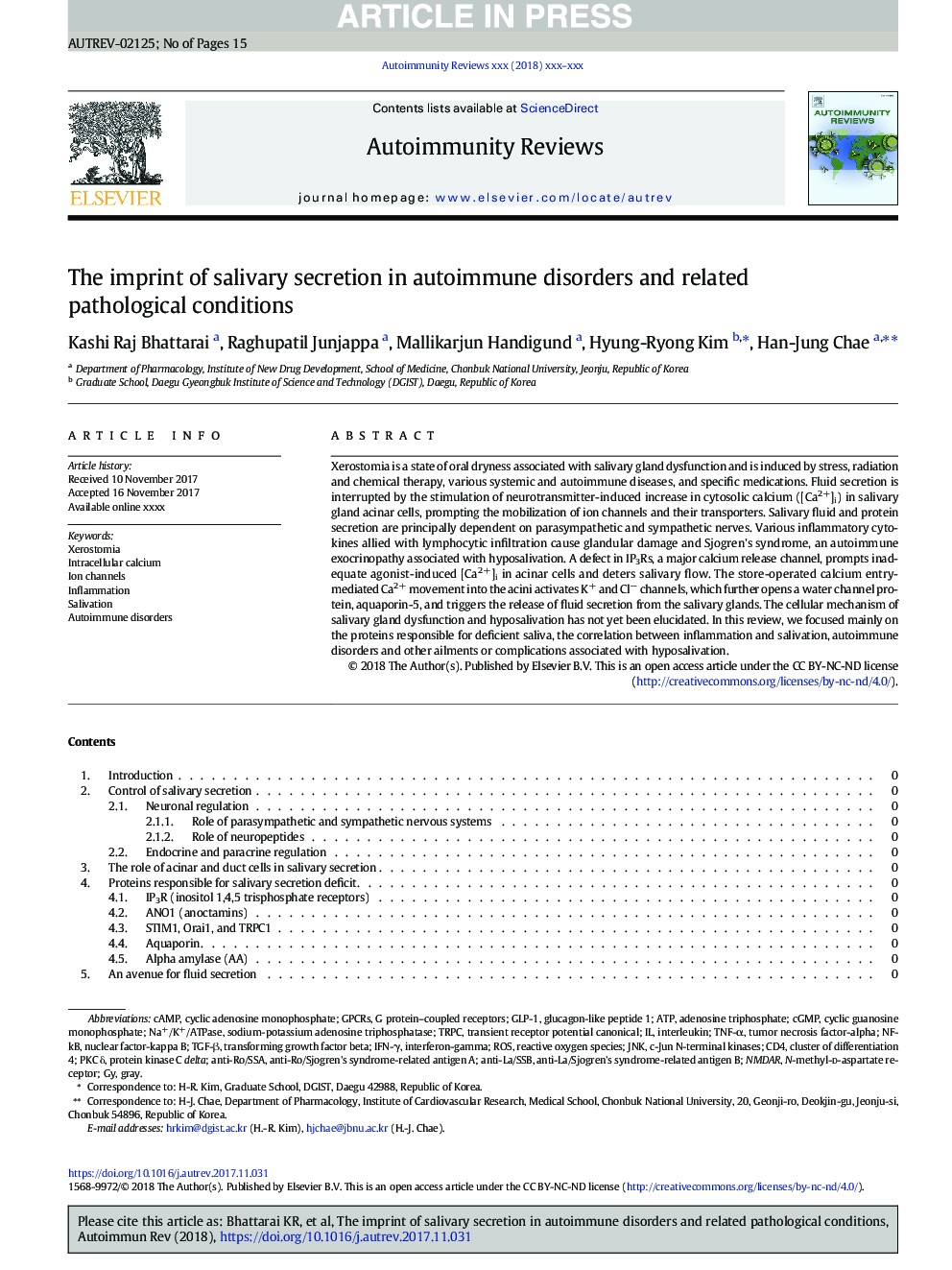| کد مقاله | کد نشریه | سال انتشار | مقاله انگلیسی | نسخه تمام متن |
|---|---|---|---|---|
| 8736425 | 1591139 | 2018 | 15 صفحه PDF | دانلود رایگان |
عنوان انگلیسی مقاله ISI
The imprint of salivary secretion in autoimmune disorders and related pathological conditions
ترجمه فارسی عنوان
تأثیر ترشح بزاق در اختلالات خودایمنی و شرایط پاتولوژیک مرتبط
دانلود مقاله + سفارش ترجمه
دانلود مقاله ISI انگلیسی
رایگان برای ایرانیان
کلمات کلیدی
TGF-βG protein–coupled receptorsGPCRsIFN-γNF-kBcGMPGLP-1NMDARPKC δCD4Anti-Ro/SSAJnkAnti-La/SSBTRPCc-Jun N-terminal kinases - C-Jun N-terminal kinasescAMP - cAMPROS - ROSAdenosine Triphosphate - آدنوزین تری فسفاتATP - آدنوزین تری فسفات یا ATPSodium-potassium adenosine triphosphatase - آدنوزین تری فسفاتاز سدیم پتاسیمCyclic adenosine monophosphate - آدنوزین مونوفسفات CyclicAutoimmune disorders - اختلالات خود ایمنیinflammation - التهاب( توروم) interferon-gamma - اینترفرون گاماinterleukin - اینترلوکینSalivation - بزاقTransforming Growth Factor Beta - تبدیل بتا فاکتور رشدtumor necrosis factor-alpha - تومور نکروز عامل آلفاGray - خاکستریXerostomia - خشکی دهان، زروستومیCluster of differentiation 4 - خوشه تمایز 4TNF-α - فاکتور نکروز توموری آلفاNuclear factor-kappa B - فاکتور هسته ای-کاپا Bcyclic guanosine monophosphate - مونوفسفات گوانوزین چرخه ایtransient receptor potential canonical - پتانسیل گیرنده گذرا کانونی استProtein Kinase C Delta - پروتئین کیناز C دلتاglucagon-like peptide 1 - پپتید مشابه گلوکاگون 1Ion channels - کانال های یونیIntracellular calcium - کلسیم داخل سلولیReactive oxygen species - گونههای فعال اکسیژنN-methyl-d-aspartate receptor - گیرنده N-methyl-d-aspartate
موضوعات مرتبط
علوم زیستی و بیوفناوری
ایمنی شناسی و میکروب شناسی
ایمونولوژی
چکیده انگلیسی
Xerostomia is a state of oral dryness associated with salivary gland dysfunction and is induced by stress, radiation and chemical therapy, various systemic and autoimmune diseases, and specific medications. Fluid secretion is interrupted by the stimulation of neurotransmitter-induced increase in cytosolic calcium ([Ca2+]i) in salivary gland acinar cells, prompting the mobilization of ion channels and their transporters. Salivary fluid and protein secretion are principally dependent on parasympathetic and sympathetic nerves. Various inflammatory cytokines allied with lymphocytic infiltration cause glandular damage and Sjogren's syndrome, an autoimmune exocrinopathy associated with hyposalivation. A defect in IP3Rs, a major calcium release channel, prompts inadequate agonist-induced [Ca2+]i in acinar cells and deters salivary flow. The store-operated calcium entry-mediated Ca2+ movement into the acini activates K+ and Clâ channels, which further opens a water channel protein, aquaporin-5, and triggers the release of fluid secretion from the salivary glands. The cellular mechanism of salivary gland dysfunction and hyposalivation has not yet been elucidated. In this review, we focused mainly on the proteins responsible for deficient saliva, the correlation between inflammation and salivation, autoimmune disorders and other ailments or complications associated with hyposalivation.
ناشر
Database: Elsevier - ScienceDirect (ساینس دایرکت)
Journal: Autoimmunity Reviews - Volume 17, Issue 4, April 2018, Pages 376-390
Journal: Autoimmunity Reviews - Volume 17, Issue 4, April 2018, Pages 376-390
نویسندگان
Kashi Raj Bhattarai, Raghupatil Junjappa, Mallikarjun Handigund, Hyung-Ryong Kim, Han-Jung Chae,
